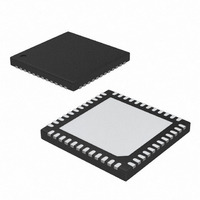MAX5863ETM+ Maxim Integrated Products, MAX5863ETM+ Datasheet - Page 23

MAX5863ETM+
Manufacturer Part Number
MAX5863ETM+
Description
IC AFE 8/10BIT 7.5MSPS 48-TQFN
Manufacturer
Maxim Integrated Products
Datasheet
1.MAX5863ETMT.pdf
(26 pages)
Specifications of MAX5863ETM+
Number Of Bits
8, 10
Number Of Channels
8
Power (watts)
22.8mW
Voltage - Supply, Analog
2.7 V ~ 3.3 V
Voltage - Supply, Digital
1.8 V ~ 3.3 V
Package / Case
48-TQFN Exposed Pad
Lead Free Status / RoHS Status
Lead free / RoHS Compliant
Ideally, the midscale transition occurs at 0.5 LSB above
midscale. The offset error is the amount of deviation
between the measured transition point and the ideal
transition point.
Offset error is the difference between the ideal and
actual offset point. The offset point is the output value
when the digital input is midscale. This error affects all
codes by the same amount and usually can be com-
pensated by trimming.
Ideally, the ADC full-scale transition occurs at 1.5 LSB
below full scale. The gain error is the amount of devia-
tion between the measured transition point and the
ideal transition point with the offset error removed.
Figure 13
sample-to-sample variation in the aperture delay.
Aperture delay (t
rising edge of the sampling clock and the instant when
an actual sample is taken
For a waveform perfectly reconstructed from digital
samples, the theoretical maximum SNR is the ratio of
the full-scale analog input (RMS value) to the RMS
quantization error (residual error) and results directly
from the ADC’s resolution (N bits):
In reality, there are other noise sources besides quanti-
zation noise: thermal noise, reference noise, clock jitter,
etc. SNR is computed by taking the ratio of the RMS
signal to the RMS noise. RMS noise includes all spec-
tral components to the Nyquist frequency excluding the
fundamental, the first five harmonics, and the DC offset.
SINAD is computed by taking the ratio of the RMS sig-
nal to the RMS noise. RMS noise includes all spectral
components to the Nyquist frequency excluding the
fundamental and the DC offset.
ENOB specifies the dynamic performance of an ADC at a
specific input frequency and sampling rate. An ideal
ADC’s error consists of quantization noise only. ENOB for
a full-scale sinusoidal input waveform is computed from:
______________________________________________________________________________________________________
SNR(max) = 6.02dB x N + 1.76dB (in dB)
ADC Dynamic Parameter Definitions
depicts the aperture jitter (t
Signal-to-Noise Plus Distortion (SINAD)
AD
Performance, 7.5Msps Analog Front End
) is the time defined between the
Effective Number of Bits (ENOB)
(Figure
Signal-to-Noise Ratio (SNR)
13).
ADC Offset Error
DAC Offset Error
AJ
ADC Gain Error
Ultra-Low-Power, High-Dynamic
Aperture Delay
Aperture Jitter
), which is the
THD is typically the ratio of the RMS sum of the first five
harmonics of the input signal to the fundamental itself.
This is expressed as:
where V
the amplitudes of the 2nd- through 6th-order harmon-
ics.
HD3 is defined as the ratio of the RMS value of the third
harmonic component to the fundamental input signal.
SFDR is the ratio expressed in decibels of the RMS
amplitude of the fundamental (maximum signal compo-
nent) to the RMS value of the next-largest spurious
component, excluding DC offset.
IMD is the total power of the intermodulation products
relative to the total input power when two tones, f
f
ucts are (f
±f
IM3 is the power of the worst third-order intermodula-
tion product relative to the input power of either input
tone when two tones, f
inputs. The 3rd-order intermodulation products are (2 x
f
at -7dBFS.
Figure 13. T/H Aperture Timing
2
1
, are present at the inputs. The intermodulation prod-
1
±f
). The individual input tone levels are at -7dBFS.
2
), (2
THD
1
DATA (T/H)
is the fundamental amplitude and V
SAMPLED
✕
1
ANALOG
±f
f
INPUT
ENOB = (SINAD - 1. 76) / 6.02
2
CLK
=
T/H
2
Spurious-Free Dynamic Range (SFDR)
±f
), (2
t
20log
AD
1
). The individual input tone levels are
TRACK
✕
Third Harmonic Distortion (HD3)
Intermodulation Distortion (IMD)
Total Harmonic Distortion (THD)
3rd-Order Intermodulation (IM3)
f
1
), (2
(V + V + V + V + V )
1
2
2
and f
✕
t
HOLD
AJ
3
f
2
2
2
), (2
, are present at the
V
1
4
2
✕
TRACK
f
1
5
2
±f
2
), (2
2
6
2
–V
1
6
and
✕
are
23
f
2








